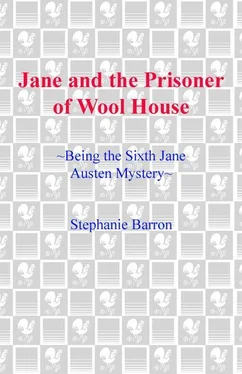Stephanie Barron - Jane and the Prisoner of Wool House
Здесь есть возможность читать онлайн «Stephanie Barron - Jane and the Prisoner of Wool House» весь текст электронной книги совершенно бесплатно (целиком полную версию без сокращений). В некоторых случаях можно слушать аудио, скачать через торрент в формате fb2 и присутствует краткое содержание. Жанр: Исторический детектив, Иронический детектив, на английском языке. Описание произведения, (предисловие) а так же отзывы посетителей доступны на портале библиотеки ЛибКат.
- Название:Jane and the Prisoner of Wool House
- Автор:
- Жанр:
- Год:неизвестен
- ISBN:нет данных
- Рейтинг книги:4 / 5. Голосов: 1
-
Избранное:Добавить в избранное
- Отзывы:
-
Ваша оценка:
- 80
- 1
- 2
- 3
- 4
- 5
Jane and the Prisoner of Wool House: краткое содержание, описание и аннотация
Предлагаем к чтению аннотацию, описание, краткое содержание или предисловие (зависит от того, что написал сам автор книги «Jane and the Prisoner of Wool House»). Если вы не нашли необходимую информацию о книге — напишите в комментариях, мы постараемся отыскать её.
Jane and the Prisoner of Wool House — читать онлайн бесплатно полную книгу (весь текст) целиком
Ниже представлен текст книги, разбитый по страницам. Система сохранения места последней прочитанной страницы, позволяет с удобством читать онлайн бесплатно книгу «Jane and the Prisoner of Wool House», без необходимости каждый раз заново искать на чём Вы остановились. Поставьте закладку, и сможете в любой момент перейти на страницу, на которой закончили чтение.
Интервал:
Закладка:
“I suppose you are one of Mrs. Seagrave's naval connexions?” she enquired.
“I am fortunate enough to have two brothers presently serving His Majesty,” I replied.
“And their rank?”
“The elder is a post captain, the younger a master and commander.”
This intelligence effectively thwarted further attempts at conversation. Nothing less than an admiral, it seemed, would do for a Lady Templeton. But her business was hardly with me; I could be ignored as a flaw in the paintwork, or a bit of thread discarded upon a table.
Her ladyship pulled on her gloves and grasped her reticule. “I may not tarry any longer, Louisa. I have wasted for too much time as it is. You know what Luxford shall be in such an hour. I may only repeat that I am not in the habit of brooking refusal. I expect you to afford my arrangements the consideration they warrant, and to vouchsafe a reply to the inn by midnight. Sir Walter and I shall be forced to start for Kent no later than ten 'clock on the morrow. Pray attend to the hour. You were never a punctual child; I hope the years have effected some amendment.”
Mrs. Seagrave pressed her hand against her eyes. “Will you not stay, and take refreshment? I believe that Sir Walter intended some project for the boys' amusement—”
“Nonsense,” returned Lady Templeton briskly. “Sir Walter must attend me to the George at once. We have not the time for frivolity. We are not come upon a pleasure party, I would have you know.”
“Charles and Edward take such delight in Sir Walter—”
“I should prefer to see less of delight, and more of self-control! They could do with firmer management, Louisa. We shall procure a tutor post-haste, once they are removed to Luxford. I certainly cannot be expected to set up as nursemaid, however much Sir Walter may enjoy his second childhood!”
Louisa Seagrave's lips parted, as though she would muster some reply; but then her sallow face flushed an unbecoming red, and she fell back into silence.
“I shall not wait for that wretched girl you chuse to call a maidservant, but shall show myself out,” Lady Templeton concluded. “The horses cannot be expected to stand long in this damp weather. Gibbon will be exceedingly angry.”
Louisa Seagrave struggled to her feet. “We must not make poor Gibbon angry; he has suffered too long already in your service.”
If Lady Templeton caught the barb beneath the simple words, she did not chuse to evidence it.
“I thank you for your attention,” Mrs. Seagrave continued formally, “and wish you every conceivable comfort on your journey into Kent; but I cannot say whether it shall be in my power to accept your kind—”
“Do not be a fool again, Louisa.”
The abrupt warning, delivered without softening civilities or the slightest attempt to guard their subject from contempt, stopped Mrs. Seagrave's pleasantries in her mouth. She bowed her head, and made no effort to escort her visitor to the door.
My gaze followed the upright, formidable figure of her ladyship as she swept into the passage; and when the door had slammed with finality behind her, I could only look to the Captain's wife with silent pity.
“You have been honoured with a glimpse of my paternal aunt,” she told me with a shaky laugh. “I learned only yesterday of the passing of my father — Charles, Viscount Luxford — at Richmond three days since; he is to be buried Tuesday at Luxford House, in Kent.”
“You have my deepest sympathy,” I said. “The loss of a parent must always be felt. I hope that he did not suffer long?”
“He died of apoplexy, after too rich a dinner; and I am sure that no man died happier than Father. He was always the sort to relish a good meal.”
It was difficult to know how to greet this intelligence. I was uncertain whether Louisa Seagrave possessed a brother who might accede to the tide, or if the estate was entailed upon another — whether she had seen her father since her headlong marriage, much less this redoubtable aunt. She was breathing heavily, as though under the spur of considerable emotion. She certainly had not mether relation with composure; but whether love, remorse, or hatred ranked uppermost in her spirits, I could not determine.
“Lady Templeton wishes me to accompany her and Sir Walter into Kent. She thinks it necessary I pay my respects.”
“That must be natural.”
“There was never anything natural in the connexion between myself and my family, Miss Austen,” Mrs. Seagrave retorted with asperity. “To think that I must now make my appearance in Kent, with my little boys in tow — the heiress returned like a bad penny, with her questionable progeny behind her — and at such a time!”
“Heiress?”
“My father has no sons, and the estate is not entailed. Lady Templeton thinks it likely that Charles— But I cannot be tiring you with such tedious family business. I shall not speak of it. Tell me what you have been reading, Miss Austen! I hear that Mrs. Jordan was in the theatre at French Street; did you happen to see her play?”
There was in her whole manner a feverish inattention to word and air that suggested the gravest anxiety. I had no notion how long a period Lady Templeton had demanded for the presentation of her schemes, but surely little of constructive activity had been accomplished in the Seagrave household this morning. Scattered about the room were signs of occupation too swiftly abandoned: a novel face downwards against a seat cushion; a boy's stick and hoop thrust into a corner; needlework hastily set aside. Mrs. Seagrave had been working at something — a small gown of dimity, no doubt for the new baby. Such is the desperate occupation of a woman's hours, while men decide the fate of the beloved, and all of existence may be summed up in a single word— guilty. We women sew, as though the world entire must hang upon a thread.
“Should you like some refreshment? A glass of wine?” I enquired. “Let me fetch you one.”
“No — that is, perhaps a small draught of Dr. Whar-ton's Comfort. It is there, on the Pembroke table—” She gestured towards the center of the small room. I collected the blue bottle, uncorked it, and offered it to her. She did not wait for a glass of water, but tipped the flagon's neck between her lips.
Whatever Dr. Wharton had prescribed, it appeared to answer her affliction. Louisa Seagrave sighed and stopped up the bottle's mouth with a hand that trembled only a little. “That is better,” she whispered. “I shall do.”
I sank into a chair. She remained standing, her sharp profile turned towards the front windows, in the direction of the sea. “They will fire a gun,” she murmured, “if he is to hang. It is no distance at all, from Lombard Street to the quay. We shall hear it. Can it be that any in Portsmouth is deaf to the sound of guns today? But perhaps they shall take him across to Spithead, and hang him there.”
“Do not speak of it,” I urged her. “It shall not come to that.”
The restless eyes returned to mine. “You cannot believe him innocent! My dear Miss Austen, make no mistake. My husband deserves to hang.”
It was the one pronouncement I had least expected, and I could find not a single word to answer it. I stared at her, horror pricking at my spine. Perhaps she was mad.
“He killed that poor fellow as surely as though he fired the ball himself.”
She knew, then, of the wound to Porthiault's temple. And yet Seagrave himself had never mentioned it when he described the French captain's last moments. He had merely spoken of a blow to the head — some wound undiscerned, that had stunned the man or killed him outright. It was Etienne LaForge who had examined the skull, and located the hole from the ball. But if Louisa Seagrave could speak of it so readily …
Читать дальшеИнтервал:
Закладка:
Похожие книги на «Jane and the Prisoner of Wool House»
Представляем Вашему вниманию похожие книги на «Jane and the Prisoner of Wool House» списком для выбора. Мы отобрали схожую по названию и смыслу литературу в надежде предоставить читателям больше вариантов отыскать новые, интересные, ещё непрочитанные произведения.
Обсуждение, отзывы о книге «Jane and the Prisoner of Wool House» и просто собственные мнения читателей. Оставьте ваши комментарии, напишите, что Вы думаете о произведении, его смысле или главных героях. Укажите что конкретно понравилось, а что нет, и почему Вы так считаете.












